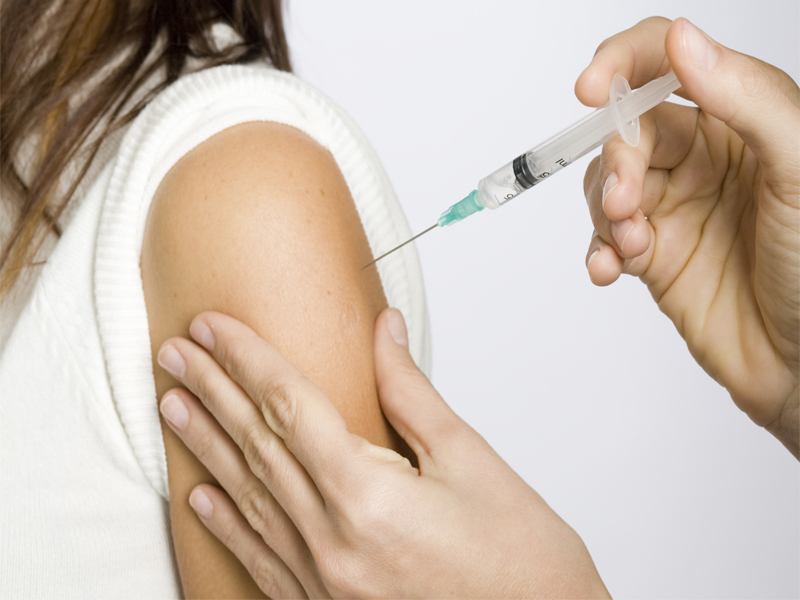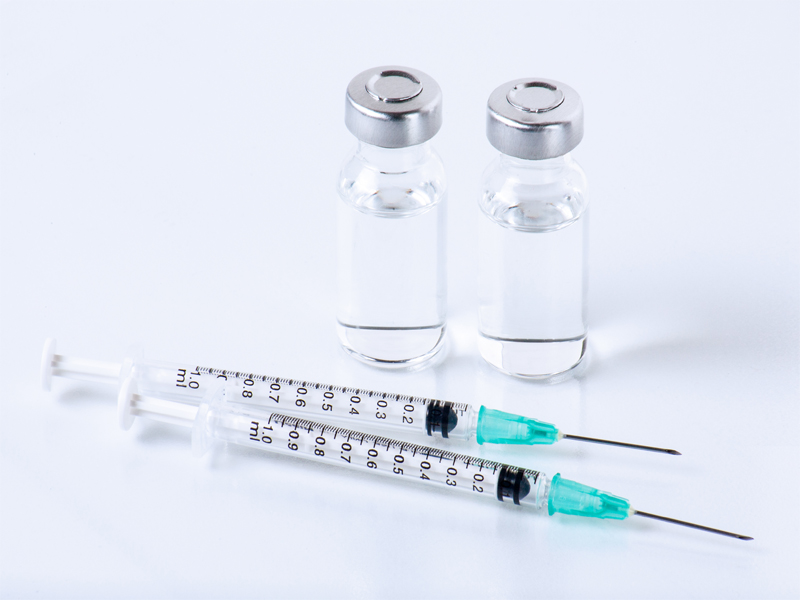Don’t think vaccinations are just for kids! The measles, hepatitis B and whooping cough can affect you at any stage of life. Here’s why, even as an adult, you need to keep your own immunisations up to date.
Not just for travellers and children
Most of us are guilty of it: keeping up to date with our children’s jabs but not our own. The truth is, adults need protection, too – yes, even when we aren’t visiting malaria-laden locations and exotic, third-world wonders with not-so-sanitary conditions.
“Although many people are familiar with childhood and travel immunisations, there is, in general, a reduced awareness of the advantages of vaccination in adulthood for routine personal protection, those who have not been previously vaccinated and the protection of certain susceptible groups of people,” says DR CLAUDIA CHEW of Complete Healthcare International (CHI).
“The recent measles outbreaks in Japan, Taiwan and the USA, as well as the quadrupling of worldwide measles cases in the first quarter of 2019, has brought to public attention the importance of vaccination and control of vaccine-preventable diseases in the advent of globalisation,” she says. “Being a major international travel hub and a densely populated cosmopolitan metropolis, Singapore remains vulnerable to outbreaks of infectious diseases, some of which are highly preventable via vaccinations.”
Another common assumption is that the vaccines received during childhood will protect you for the rest of your life.
“This is only partially true, and it’s dependent on your specific immunisation history and the type of vaccine-preventable illness in question,” says Dr Chew. “For instance, immunity to hepatitis B, tetanus, diphtheria and pertussis decreases over the years. An ageing population and increased burden of chronic lifestyle diseases such as diabetes also increase the risk of serious illness caused by common vaccine-preventable infections such as influenza and pneumococcus.”

With Singapore’s recent establishment of the National Adult Immunisation Schedule (NAIS), awareness and uptake of adult immunisation will likely improve.
The recommended routine adult vaccinations in the NAIS include influenza, pneumococcal, Hepatitis B, diphtheria, tetanus and pertussis (Tdap), human papillomavirus (HPV), measles, mumps and rubella (MMR), chickenpox and shingles.
“You should discuss any specific vaccination needs with your GP to assess your requirements and suitability to receive the recommended adult vaccines,” says Dr Chew. “If you travel frequently, you may also want to consider vaccinations for Hepatitis A and typhoid, which are spread via contaminated water and poor sanitation. Also, certain countries may also have other specific recommendations, such as the Japanese encephalitis vaccine for Myanmar, for instance. Make sure to complete your vaccinations at least two weeks before travel so the protective response has time to take effect.”
What’s on the list?
Here’s a closer look at the infectious illnesses that are on the must-have list for routine inoculation.
Influenza (flu)
Recommended for all adults and children annually, the flu vaccine is especially important for those 65 years and older, pregnant women, people with weakened immune systems, and those who work in a healthcare setting or care for someone at high risk of flu-related complications including people with certain chronic medical conditions such as diabetes and chronic lung disease, for instance.
Influenza is caused by the highly contagious influenza virus: type A, B or C. Influenza A viruses are the most pathogenic and account for more severe illnesses and complications. These complications can include inflammation of the heart, brain or muscle and even multi-organ failure.
According to the team at CHI, the influenza vaccination has been shown to be clinically effective in reducing the rate of hospital admissions as well as reducing the incidence of influenza-related mortality in the older population. The traditional “influenza seasons” are from April to July and November to January when there is a peak in reported cases.
Pneumococcal pneumonia
“Pneumonia has been consistently ranked as the second most common cause of death in Singapore for the past several years,” says Dr Chew. “Pneumonia and other life-threatening infections caused by strains of the bacterium Streptococcus pneumoniae (such as sepsis, meningitis, sinusitis and middle ear infections) can be prevented by two types of vaccines for use in adults. This is especially important for people aged 65 years and older, those with weakened immune systems or chronic illnesses such as diabetes or heart disease.”
Hepatitis B
“This virus is a major cause of chronic liver inflammation and liver cancer worldwide,” says Dr Chew. “Hepatitis B is usually spread via infected blood and blood products, bodily fluids and sexual contacts. Adults at increased risk include those in certain occupations such as healthcare, those with sex partners or household contacts who are hepatitis B carriers and travellers with long stays or frequent travels to regions with a high hepatitis B incidence.”
“Although hepatitis B is part of the childhood immunisation programme in many countries, immunity usually declines with age,” explains Dr Chew. “The hepatitis B antibody level can be checked with a simple blood test. Three doses of the vaccine over a six-month period is recommended if one no longer has any antibodies. Alternatively, a once-off booster can be administered if antibodies are still detected but in the low range.”
Tetanus, diphtheria and pertussis
Diphtheria is a serious bacterial infection that affects the mucous membrane of the nose and throat. The bacteria can release a dangerous toxin into the bloodstream that can damage organs including the heart, brain and kidneys. Tetanus infection causes serious, painful spasms and stiffness in all muscles of the body. It can cause a locking of the jaw, which can result in difficulties with opening the mouth, swallowing and breathing. Pertussis (whooping cough) is a highly contagious respiratory tract infection that causes violent, uncontrollable coughing, making it hard to breath, eat and drink.
After the primary series of doses in childhood, booster vaccines for tetanus, diphtheria and pertussis should be administered once every ten years. (Pertussis has become a re-emerging infection recently because of waning immunity in adults.)
Vaccination is especially important for those who are in close contact with infants, and pregnant women are advised to get a booster dose of the vaccines during the third trimester of every pregnancy to help protect the baby from pertussis in the first few months of life.
Human papillomavirus (HPV)
HPV is a virus that causes precancerous and cancerous lesions on the cervix. It can also cause cancers of the vagina and vulva in women. In men, it can cause penile cancer, cancer of the anus and oral cavity as well as genital warts.
“The latest HPV vaccine (Gardasil 9), previously recommended for both women and men aged 26 years and below, is now also FDA-approved for a broader age range until 45 years. This vaccine protects against nine strains of the virus,” says Dr Chew.
Measles, mumps and rubella (MMR)
Measles virus can lead to ear infection, pneumonia, seizures and encephalitis; mumps virus can lead to deafness, meningitis, encephalitis and painful swelling of the testicles or ovaries; rubella virus, if caught during pregnancy, can have serious implications on the baby, resulting in deafness, heart abnormalities and brain damage. The MMR vaccine can protect children and adults from all three of these potentially serious diseases. You can get the first dose of MMR at any time and repeat with a second dose at least four weeks after.
“Despite the rise of misinformation and scare-mongering regarding the MMR vaccine, which has contributed to the recent outbreak, the vaccine is, in fact, one of the most studied, and has been verified to be both safe and effective,” says Dr Chew.
Varicella zoster (chickenpox)
This vaccine is given if you didn’t have chickenpox as a child or adolescent, if you’re not sure if you’ve had chickenpox, or if you’re considering pregnancy and don’t know if you’re immune to chickenpox. Vaccination reduces the risk of chickenpox by 90 percent and the risk of severe or fatal complications (pneumonia and encephalitis, an inflammation of the brain) by more than 98 percent. Even those who have been vaccinated can still catch chickenpox (the vaccine is 90 percent protective); however, the disease is a much milder form with a lower incidence of fever and fewer blisters and scarring. The recommendation is two doses for all adults (if this was not done during childhood) with at least a four-week interval after the first dose.
Herpes zoster (Shingles)
Shingles is a painful rash that can develop on one side of the body, face or torso. The rash forms blisters that scab over in seven to 10 days; it clears up in two to four weeks. For some people, the pain can last for months after the rash has disappeared. The shingles vaccine is recommended for people aged 60 and older. It’s given as a single shot, and it reduces the risk of developing shingles by 51 percent and the associated complication of postherpetic neuralgia (PHN) by 67 percent.
Complete Healthcare International is at #10-01 Shaw House, 350 Orchard Road.
6776 2288 | chi-health.com.sg
Like this? See our Health & Fitness section:
Top personal trainers in Singapore
Chiropractic, osteopathy, physiotherapy clinics and more







